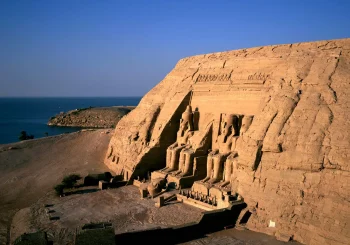A new study published in the journal Nature Communications suggests that revolts and social unrest were triggered by volcanic eruptions in other parts of the world, brought about by climate change.
The paper demonstrates that changes in climatic conditions and natural disasters in the global north likely impacted the Nile watershed by slowing down the river’s flow.
Failed harvests and frequent famines, in turn, led to socio-economic trouble and revolts against the ruling Ptolemaic state (305-30 BCE).
The findings are based on research that combined ice core dating of ancient volcanic eruptions with papyrus records of political upheavals. It argues that almost every single time a volcanic eruption occurred during Egypt’s Ptolemaic era led to uprisings and socio-economic changes.
“We started comparing [dates of revolts and eruptions], and it was amazing how the revolts were matching up exactly with the eruptions,” Yale University historian Joseph G. Manning, who led the project, said.
“It shows there are real political and societal consequences to environmental changes like global warming and disasters,” he continued.
“We act as if these things won’t affect us. But when you see how advanced civilizations of the past could at times be pushed over the edge by events like these, it suggests that we should be treading lightly on the Earth.”
Egypt’s Ptolemaic dynasty, who controlled Egypt for almost three hundred years, is well-known for its cultural and military prosperity. Their rule was based in the then Greek city of Alexandria and established the renowned Library of Alexandria and the iconic lighthouse, recognized as one of the Seven Wonders of the Ancient World.
Despite being immensely powerful, the Ptolemaic Empire was strongly dependent on crops that were watered by the Nile’s summer flooding. When the flooding did not occur, harvests failed to result in famine and social and political upheavals.
“It’s a bizarre concept that Alaskan volcanoes were screwing up the Nile, but in fact, that’s what happened,” said Manning.
To further support their claims, the team of researchers used statistical records of Nile floodings and volcanic eruptions and compared them to well-dated papyrus documents that recorded dates of revolts and other social unrest. When comparing the occurrences of volcanic eruptions, Nile flooding and upheavals in Egypt, strong correlations were discovered, which suggested relations of causation.
Links between volcanic eruptions and effects on Egypt during different historical have also been found by other researchers.
Alan Mikhail, in a paper entitled Ottoman Iceland: A Climate History, argues that a series of eruptions in the late 18th century of the Laki volcano in Iceland had serious effects on access to food. The eruptions brought about droughts, famine and “rural economic and political mayhem” that also had real political effects locally in Egypt and also reached the central government in Istanbul.
The authors of the new study, however, are sure to stress that the failure of the Nile to provide water for harvests was not the only reason leading to political turmoil. Other reasons included tensions between Egyptian and Greek elites, taxation by the state and the burden on state coffers to constantly being embroiled in military operations.
Nevertheless, the study adds to the growing awareness about the extent to which climate change indeed has real effects on our daily lives.






Comments (0)